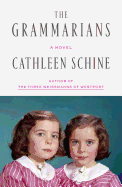
When they were children growing up in Larchmont, N.Y., Laurel and Daphne Wolfe were essentially fused particles; their mother feared that her identical twins wouldn't fit in as they went through life because "they seemed to fit nowhere but with each other." When they were five, their father brought home an anvil of a dictionary, sparking the twins' obsession with words, which, while initially a shared passion, ended up coming between them. Could it be that all the words in the world can be insufficient when it comes to making amends? In its opening chapter, which is set when the sisters are middle-aged, The Grammarians reveals that they haven't spoken in years.
When each twin's attempt to hone a distinct identity through attending a different college failed, they both transferred to Pomona in California, after which they began their truly adult lives in an apartment in Manhattan's East Village in the late 1970s. Obliged to find work to pay the bills, the sisters moped down different career paths (Daphne took a job at an alternative journal, Laurel as a kindergarten teacher), but both later found their true callings: working with words, one grammatically, the other artistically.
Schine lays all this out with the deliberateness of someone setting a table with the good china. Her 11th novel, which follows note-perfect outings that include The Three Weissmanns of Westport and Fin & Lady, burbles with her customary witty and exacting observations. Neither Wolfe sister may feel that she will ever achieve her dream of landing on exactly the right words, but Schine pretty much finds them all. --Nell Beram, author and freelance writer

